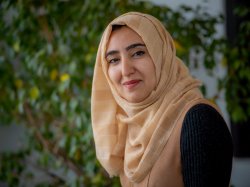Scholar who Escaped Taliban Finds Purpose in U.S. Academia
At Montclair State University, Roya Saqib dedicates her teachings to those who are left behind
Posted in: Homepage News, University

In each retelling of her escape from Kabul, Roya Saqib painstakingly goes over the details of desperation to get to safety. The chaotic airport scene – tear gas, children’s cries and gunfire, the sweltering heat and crush of people, the blocked airport gate, and finally, rescue and the ache of leaving loved ones behind.
The story has not gotten easier to tell in the seven months since Saqib fled the Taliban regime at the end of America’s war in Afghanistan. As an employee of the collapsed government – a technical assistant to the country’s president – and an activist for women’s rights, Saqib risked retaliation if she remained.
“I was also concerned that I had no future, that everything I’ve done and earned in my life with lots of difficulties and challenges would all just go back to zero and I would be sitting at home, doing nothing and looking at what’s happening in my country without being able to stop or change it,” she recalls.
In her new position at Montclair State University, Saqib has been appointed an instructional specialist in the College of Humanities and Social Sciences, and is also pursuing research as an Afghan Crisis Fellow with New York University. “I’m one of the lucky ones to have these opportunities, but many are back in Afghanistan, they’re still suffering,” Saqib says. “That’s why I want to work for those who are left behind.”
Her story, combined with her academic and professional achievements, and her resilience in the face of life challenges, inspired members of the Montclair State University Foundation to provide the funding for the teaching position in the Department of Political Science and Law.
“As an engaged university, we act to build the world that we want to live in, and we know that our actions speak louder than any words can,” says University President Jonathan Koppell. “At times, those actions may feel small in comparison to the scale of the tragedies unfolding around the globe, yet we are not deterred because in making this seemingly modest contribution we underscore the role we can all play in creating a more just world.”
Providing a safe haven for displaced scholars is consistent with the University’s identity and mission as a public-serving institution, and includes past scholar rescues from Syria, Iran, Palestine and Iraq through the Institute of International Education program. With Russia’s invasion of Ukraine, the University also plans to welcome a Ukrainian scholar this summer.
“The pain and sadness felt by members of our University community in response to ongoing violence and injustice is profound, especially for those who have loved ones, friends and colleagues in nations beset by devastating humanitarian crises wrought by callous indifference to human suffering,” Koppell says.
Saqib is a Fulbright scholar who has studied in India and the United States. “My life has been impacted by the lack of security, uncertainties, war and migration. It’s not just me, it’s anyone who experienced the civil war, migration and decades of conflict in Afghanistan. That has been challenging and most of us have given up our hopes and goals,” Saqib says.
It’s a story that resonates with University Foundation board member Robert Gregory. “I come from immigrant families, some of whom were escaping diaspora, and in similar circumstances, in a hurried way in the middle of night, being thrown out of their homes, crossing mountains to come here to find a way to rebuild,” he says.
“We are at a crossroads in geopolitics,” Gregory adds, “in that we have to start deciding who we really want to line up with, what values we want to promote and how we want to get that point across in the most meaningful way. So whether it’s in Ukraine or Afghanistan or Yemen, or any number of other places in Sub-Saharan Africa, in China or Asia, or anywhere in the United States, we’re at an inflection point. If we don’t embrace this as our mission, then I think we are in danger of losing our way as a liberal democracy.”
Gregory was a lead sponsor in the University’s support of Saqib. “Foundation members are all fundamentally committed to the idea of improving the educational experience for our students, giving them a rich experience and exposing them to many different ideas,” Gregory says. “We’re a polyglot, multicultural campus. That’s our mission.”
This spring, Saqib served as a guest lecturer, including for the University’s Pollack Speaker Series on International Security and Diplomacy. In the fall, she will teach undergraduate courses on international relations, political science and social change. Her work with NYU will examine the impact of war in the past decades on the life of young generations and advocate investments for future generations of Afghans to live in communities free of fear and violence.
“Whenever I get a request about talking and discussing the issues in Afghanistan, I keep accepting. Sometimes it gets overwhelming but I realize I cannot say no to anything pertaining to Afghanistan,” Saqib says.
“I thank God for the situation that I am in. I know that I’m in a good place personally,” she says, adding that she left part of herself in Afghanistan. “When I was leaving, I was thinking I’m just carrying half of myself. My half side is OK, doing well, I’m safe. But then the other half is not. Even if you are counting your blessings, you cannot feel happy.”
Story by Staff Writer Marilyn Joyce Lehren. Photo by University Photographer Mike Peters.
You May Also Like:
- Uprooted yet again: Anthropology Professor supports refugee families displaced by Hurricane Ida
- Celebrating Survival and Triumph: Ravina family honors mother’s incredible Holocaust story and father’s music legacy
- The Freedom to Learn: A Decade of educating Afghanistan’s future women leaders
